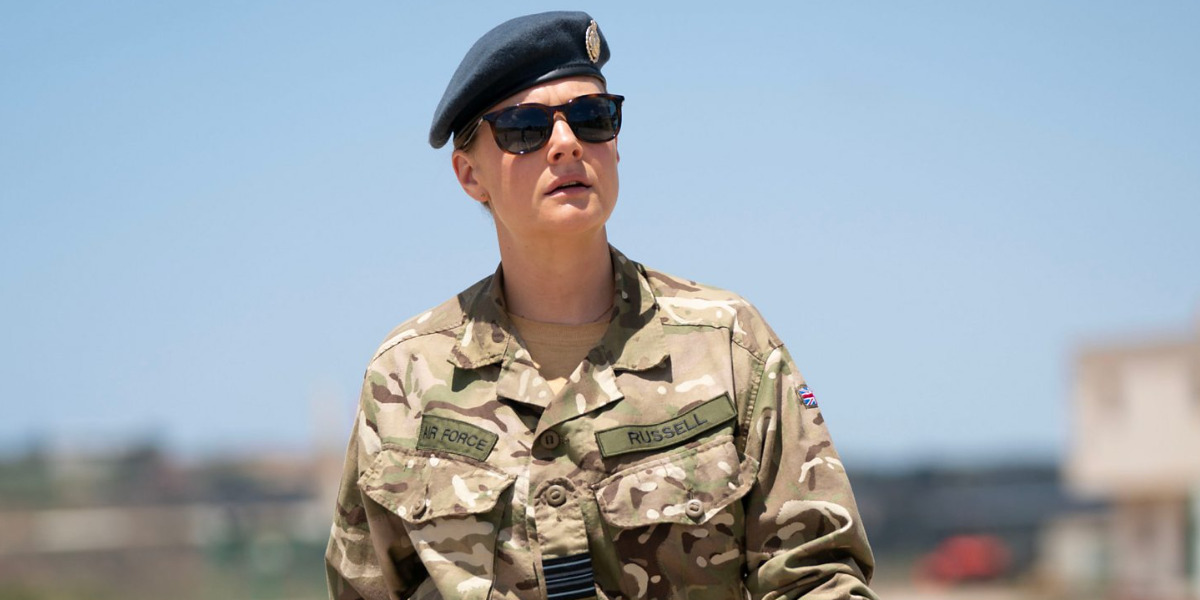With its second season, BBC’s ‘Vigil’ charts another thrilling investigation helmed by DCI Amy Silva and DI Kirsten Longacre, partners in their professional and personal lives. For this season, the narrative swaps out the claustrophobic, tense environment of a Navy submarine for the politically taut foreign lands of Wudyan, which becomes the backdrop for Amy’s investigation into a military crime away from home. An Air Force weapons test demonstration ends in several casualties after a drone gets hacked by an outside source. As a result, with crucial UK and Wudyani relations on the line, Detective Silva and her team must track down the perpetrators behind the crime and bring them to justice.
Similar to the militarized environment of the HMS Vigil Submarine, Wudyan’s Al Shawka Airbase, where Amy spends the majority of her time, offers a tense, often hostile surrounding for the detective. Therefore, as the political plot unravels, with Wudyan at its center, viewers must be compelled to question the country’s roots in reality.
Wudyan and Al Shawka Airbase: Fictionalized Narrative Elements
No, Wudyan from ‘Vigil’s’ second season is not an actual Middle Eastern country. Likewise, the Al Shawka Airbase that features heavily in the fictionalized country is another fabricated element. Despite ‘Vigil’s’ occupation of the crime and military genres, the show has always remained a largely fictionalized account. As such, season two continues the practice by crafting Wudyan’s fictional backdrop for Amy’s latest adventures to unravel.

For the most part, Wudyan’s physicality finds its basis in Morocco, where the crew shot a majority of the scenes for the former fictional country. Similarly, Al Shawka Airbase, home to most central characters like Eliza Russell, Callum Barker, and momentarily Amy Silva too, also remains a fictional official establishment. According to reports, the base finds its physical origin in the Royal Moroccan Air Force base, situated at Kenitra.
Still, despite its lack of real-life basis, the show utilizes Wudyan and its socio-political themes to highlight issues that remain prevalent in reality. In the show, Wudyan is a Middle Eastern country caught in a hostile war with its neighboring nation that has made several victims out of its civilian population. Furthermore, the dictatorship government within the country has compelled a vocal rebellion group, Jabhat Al Huriya, to rise, earning themselves a terrorist tag.
Consequently, through the complicated political relationship between the UK and Wudyan, the film highlights the former’s involvement in exporting weapons to foreign countries with repressive regimes. Considering that, according to The Guardian, the UK supplied weapons worth more than a billion euros to Saudi Arabia, the relevancy of Wudyan’s fictional depiction remains evident. Likewise, the country’s regressive society, specifically hostile toward women and the queer community, also reflects real life. Nevertheless, no outright parallels are drawn between the political deal showcased in the show between the UK-Wudyan and a real-life counterpart.
Thus, the show maintains a fair distance from reality while making socio-politically relevant statements about the real world simultaneously. Furthermore, in a more thematic sense, Wudyan presents a dynamic distinguishment between season one’s submarine storyline, setting the latest installment apart while retaining a signature defining factor. Ultimately, Wudyan remains a fictionalized country that manages to convey relevant aspects of real life.
Read More: Are Vigil’s Amy Silva and Kirsten Longacre Based on Real Police Officers?


You must be logged in to post a comment.